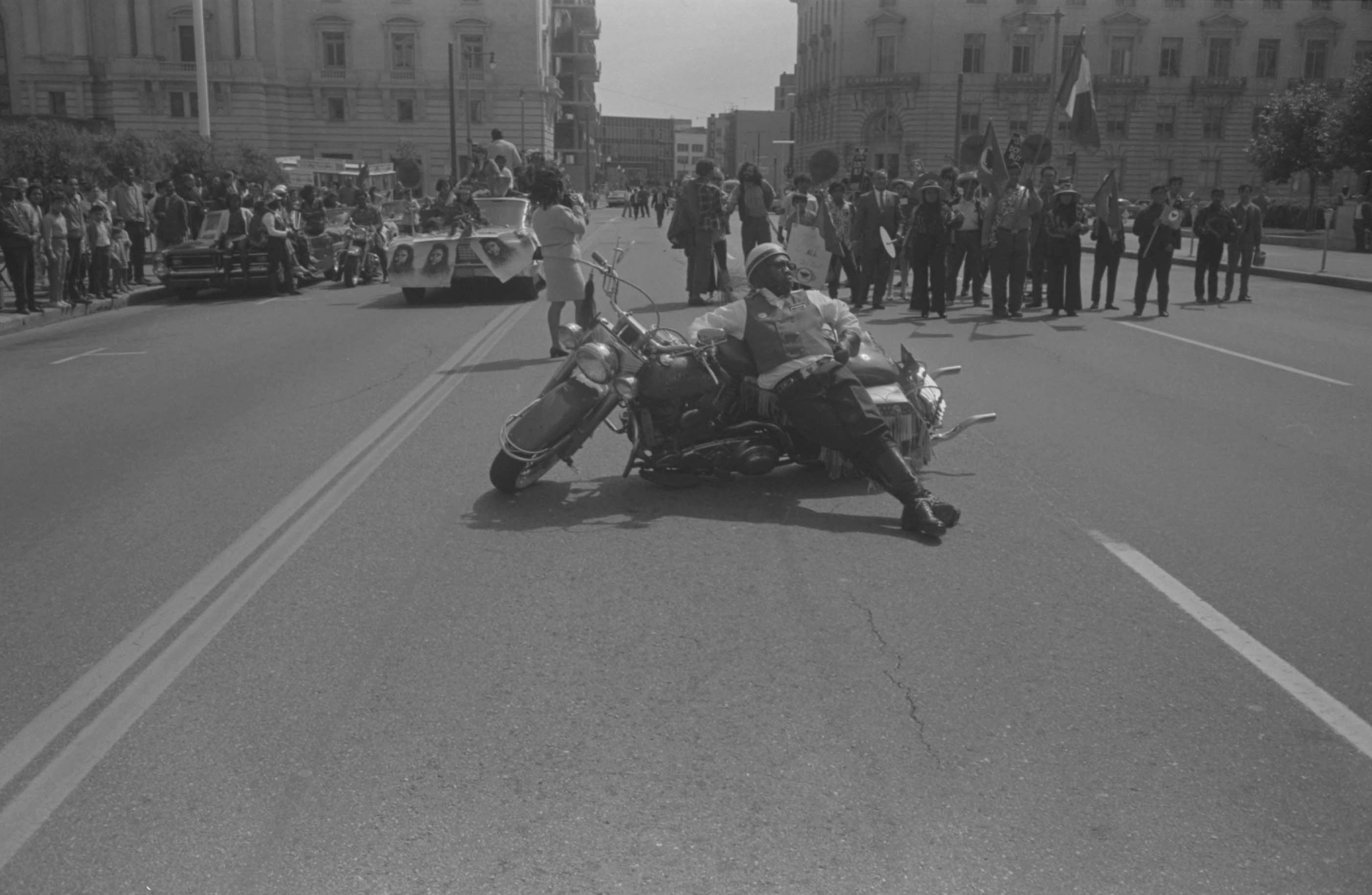Delano Support Committee rally in San Francisco
Delano Support Committee rally in San Francisco
United Farm Workers Organizing Committee (UFWOC) supporters walk on the street. A “Viva la Huelga” P&F (Peace and Freedom) sign, a Hollister Farm Thunderbird banner, and the American flag are visible. They are headed to a rally at City Hall for the Delano Support Committee. San Francisco, September 15, 1968. Photo by John Kouns.
In 1968, the UFW launched a boycott of Safeway supermarkets, targeting a store in San Francisco that refused to support the UFW’s grape boycott by selling strikebreaker-picked grapes. The grape boycott was a contentious affair, with farmworkers and their supporters often bearing the brunt of anti-farmworker and anti-boycott violence—UFW organizer Lupe Munguía was physically assaulted by the Safeway store manager and a security guard, requiring hospitalization for his wounds; activist Fred Ross, Jr. was shot at by a security guard while distributing flyers. In September 1968, San Francisco Mayor Joseph Alioto offered his support for the farmworkers’ demand for collective bargaining and offered to mediate the dispute, despite rejections.
UFWOC supporters demonstrate in front of City Hall. A Virgin of Guadalupe banner and a UFWOC AFL-CIO “Don’t buy grapes here” sign are visible. A band is playing on a stage in front of City Hall. San Francisco, September 15, 1968. Photo by John Kouns.
That same year, the GI Forum, a prominent Mexican American veteran’ and community advocacy organization, announced its support of the grape boycott; the Seattle Cannery Workers Union and the Filipino American Political Association (FAPA) also joined the boycott. Additionally, Roman Catholic leaders throughout the nation voiced their support for the farmworkers, including Archbishop Robert Lucey of San Antonio, and Archbishop Karl J. Alter of Ohio, who called for the growers to comply and for the NLRB to be extended to farmworkers, respectively. Unfortunately, resistance was expected and entrenched, especially in a society determined to deny farmworkers basic dignity and rights. In 1968, El Malcriado reported a federal plot to destroy the grape boycott, highlighting that the increase in grape exports, in the face of a nationwide boycott that gained traction daily, was in fact pushed by the federal government purchasing them to help feed American soldiers stationed in Vietnam.
El Malcriado also reported that the federal government conspired to further crush the UFW’s efforts by opening the border, which helped squash the strikes in Texas and in California’s Coachella Valley. Just as this was taking place, American politicians and those aspiring to higher office opined on the topic: Alan Cranston, candidate for Senate for California, voiced his support for farmworkers and placed the blame squarely on the growers. Adding insult to injury, however, Republican presidential candidate Richard M. Nixon, ignoring the plight and experiences of the farmworkers, decried the grape boycott as “unnecessary,” “illegal,” and as “illegal economic pressure,” exhorting them to “follow the law”; Nixon was referring to the National Labor Relations Board (NLRB), which purposely left out farmworkers from its celebrated protections. Shortly thereafter, Nixon gave his famous “silent majority” speech, simultaneously capturing the white vote and unleashing a regime of “law and order” whose consequences for marginalized communities remain to this day.
Space Riders Drill Team members ride on motorcycles. They are headed to a rally at City Hall for the Delano Support Committee. San Francisco, September 15, 1968. Photo by John Kouns.
A man leaning on motorcycle on the road next to UFWOC marchers, San Francisco, CA, 1968
A member of the Space Riders Drill Team leans on a motorcycle on the road next to UFWOC marchers. They are near City Hall, where there is a rally for the Delano Support Committee. San Francisco, September 15, 1968. Photo by John Kouns.
Tom & Ethel Bradley Center
California State University, Northridge
18111 Nordhoff Street, Northridge, CA 91330
Phone: (818) 677-1200 / Contact Us


